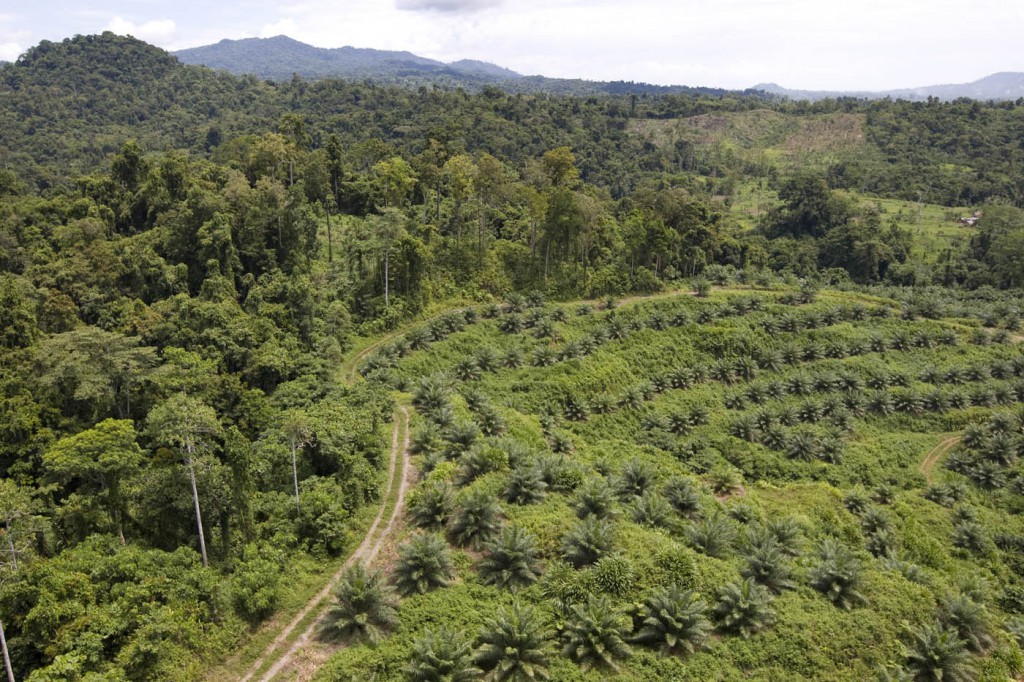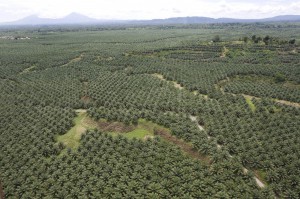Cargill Inc., the world’s largest agribusiness company, has announced the sale of their palm oil plantations in the remote tropical nation of Papua New Guinea (PNG). Cargill owns mills and plantations in Indonesia, Malaysia, and until today, PNG, and trades palm oil globally produced by at least 25 additional palm oil producers in Indonesia and Malaysia.
Cargill’s oil palm operations in PNG destroyed rainforests – Photo by Greenpeace PNG
Just three months ago RAN released a case study, based on original field research carried out by RAN and the International Accountability Project, on Cargill’s palm oil operations in PNG. Commodity Colonialism reports that serious environmental and social issues threaten the sustainability of Cargill’s plantations there, with a special focus on the dangers of converting once independent and self sufficient Papuan farmers into indebted laborers through Cargill’s use of share cropping contracts.
After five years of operations in PNG, Cargill is turning their palm oil plantations over to New Britain Palm Oil, along with a range of unfilled commitments to the people and government of PNG.
It is unclear what will become of the thousands of indebted Papuans who remain bound under contract to exclusively produced oil palm for Cargill at prices set by the company, of the polluted rivers and watersheds Cargill is leaving behind, or the roads Cargill made a commitment to build and maintain in the rugged interior.
Cargill did not release any official comments but insiders point to the strong criticisms of Cargill’s unsustainable palm oil production by customers and the media as a likely reason Cargill decided to exit the country. Recent contract cancellations against the Indonesian palm oil producer Sinar Mas, Cargill’s single-largest palm oil supplier, have led to questions of Cargill’s support of, and profits from, rainforest destruction in neighboring Indonesia.
Cargill’s Oro Bay palm oil plantation – Photo by Greenpeace PNG
Back in PNG, local communities have spoken out on the damaging effects palm oil production has on the farms, forests, and rivers they have depended on for tens of thousands of years for survival. The lack of Free, Prior, and Informed Consent (FPIC) in Cargill’s sharecropping agreements, the lack of training to use dangerous pesticides, and the use of child labor are also among the most serious concerns expressed by locals living at Cargill’s three PNG plantations.
Cargill’s entrance into palm oil production in PNG gave rise to concerns that the company would use its financial and political influence to undermine the strict protections the constitution of PNG provides to community forests and farms through the recognition of communities’ customary land rights. It appears that these strict constitutional protections, which prevented Cargill from rapidly expanding it’s PNG plantations, played a significant role in Cargill’s decision to stop producing oil palm in PNG. A World Bank social impact report that noted increases of debt, prostitution, alcohol, and violence at PNG’s palm oil plantation communities, providing additional reasons for Cargill to disassociate themselves with PNG palm oil.
New Britain Palm Oil’s Togulo palm oil operations in PNG replaced natural rainforest in 1979. – Photo by Greenpeace PNG
New Britain Palm Oil (NBPO) is a long-time producer of palm oil in Papua New Guinea with a reputation for respecting local communities and a cautious approach to oil palm expansion, but NBPO’s plans for Cargill’s holdings are unknown. One this is for certain though, NBPO will now have to clean up Cargill’s palm oil mess in PNG.
David Gilbert is a Research Fellow at RAN. He has worked in the tropical forests of the Amazon and Indonesia, with a special focus on forest conservation and indigenous rights.
He can be reached at davidgilbert@ran.org


